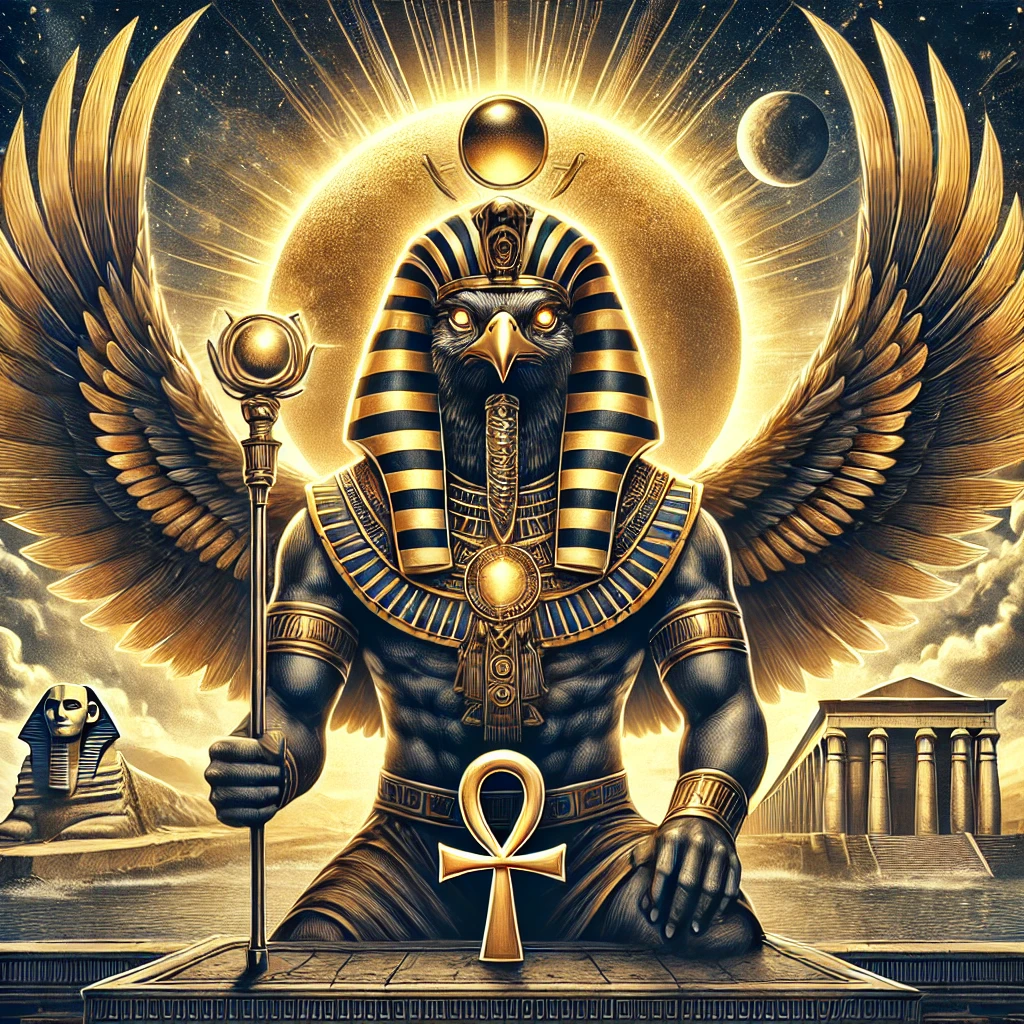Definition
Horus is one of the most important and enduring deities in ancient Egyptian mythology. Known as the Falcon God of Kingship, the Sky, and Protection, Horus symbolizes divine authority, royal power, and the unification of Egypt. He is often depicted as a falcon or a man with the head of a falcon, wearing the double crown of Upper and Lower Egypt. Horus was considered both a sky god and the living embodiment of the pharaoh, making him central to both spiritual belief and political identity in ancient Egypt.
Origins and Mythological Lineage
Horus exists in multiple forms and lineages throughout Egyptian history, evolving over time into a complex deity with overlapping identities:
- Horus the Elder (Heru-ur) – A primordial sky god and one of the earliest forms of Horus, often depicted alongside Seth in myths of cosmic balance.
- Horus the Younger (Heru-sa-Aset) – The most well-known form, son of Osiris and Isis, and avenger of his father’s murder.
- Avenger of Osiris – In this powerful myth, Horus battles his uncle Seth, who murdered Osiris, to reclaim the throne of Egypt. This myth forms the foundation of his role as the rightful heir and divine protector of kingship.
Through this mythology, Horus became the symbol of legitimacy, justice, and victorious light overcoming chaos and darkness.
Symbols and Iconography
- Falcon – Symbol of the sky, speed, and divine perspective.
- Eye of Horus (Wedjat) – Represents protection, health, restoration, and inner vision. It is a powerful amulet in Egyptian symbolism.
- Double Crown (Pschent) – Worn by Horus to signify rulership over both Upper and Lower Egypt.
- Scepter and Ankh – Emblems of authority and eternal life.
- Winged Sun Disk – A solar aspect of Horus associated with divine protection.
Horus is commonly portrayed as:
- A falcon flying across the sky, with the sun and moon as his eyes.
- A falcon-headed man, wearing royal regalia.
- A child (Harpocrates) seated on Isis’s lap, symbolizing innocence and divine potential.
Roles and Powers
1. God of Kingship and Divine Authority
Horus embodies the divine right to rule. Every pharaoh was believed to be a living manifestation of Horus on Earth, and upon death, the pharaoh would become one with Osiris. Horus ensured the continuity of dynastic power and served as a model of just and rightful leadership.
2. Sky God and Cosmic Guardian
As a sky god, Horus is associated with the sun and moon, often said to be his right and left eyes. He watches over the world from above, ensuring cosmic order (Ma’at) and balance.
3. Protector and Warrior
Horus is a fierce warrior who defeats chaos (embodied by Seth). He is a protector of the pharaoh, Egypt, and the people, defending them from evil and disorder.
4. Symbol of Restoration and Healing
The Eye of Horus represents wholeness and healing. In myth, after losing his eye in battle, it was restored by Thoth, making it a symbol of recovery and protection.
The Contendings of Horus and Seth
One of the most famous Egyptian myths, “The Contendings of Horus and Seth,” details the long struggle between Horus and his uncle Seth for the throne of Egypt:
- After Osiris was murdered by Seth, Horus sought to avenge him and reclaim the throne.
- The gods presided over their contests, which included trials of strength, wit, and endurance.
- Despite injuries and deception, Horus ultimately triumphed, symbolizing justice over chaos.
- His victory affirmed his status as rightful ruler and protector of the land.
This myth provided the theological foundation for the pharaoh’s role as a divine ruler, endorsed by the gods.
Temples and Worship
Temple of Horus at Edfu
- One of the best-preserved temples in Egypt, located on the west bank of the Nile.
- Built during the Ptolemaic period and dedicated to Horus as a protector of the people and king.
- Features elaborate reliefs of Horus defeating Seth and performing sacred rites.
Other Worship Sites
- Horus was also worshipped in Nekhen (Hierakonpolis) and other cities throughout Egypt.
- He was honored in festivals, royal ceremonies, and coronation rituals where new pharaohs took on his divine mantle.
Spiritual Significance and Modern Interpretation
In modern spiritual and esoteric traditions, Horus represents:
- Spiritual sight and higher awareness (linked to the Eye of Horus).
- Victory through perseverance and divine will.
- Balance between masculine power and moral justice.
- Initiation into sacred kingship and leadership.
- Solar energy, light, and the divine mind.
He is sometimes seen as an archetype of the spiritual warrior and awakened consciousness in mystical and metaphysical circles.
Conclusion
Horus is a central figure in Egyptian mythology, representing the triumph of light over darkness, the divine order of kingship, and the restoration of justice. As the falcon god who soars above the earth, he watches over the living and the dead, ensuring protection, legitimacy, and harmony. His presence endures as a symbol of vision, power, and the sacred right to lead, inspiring seekers and sovereigns across time.

